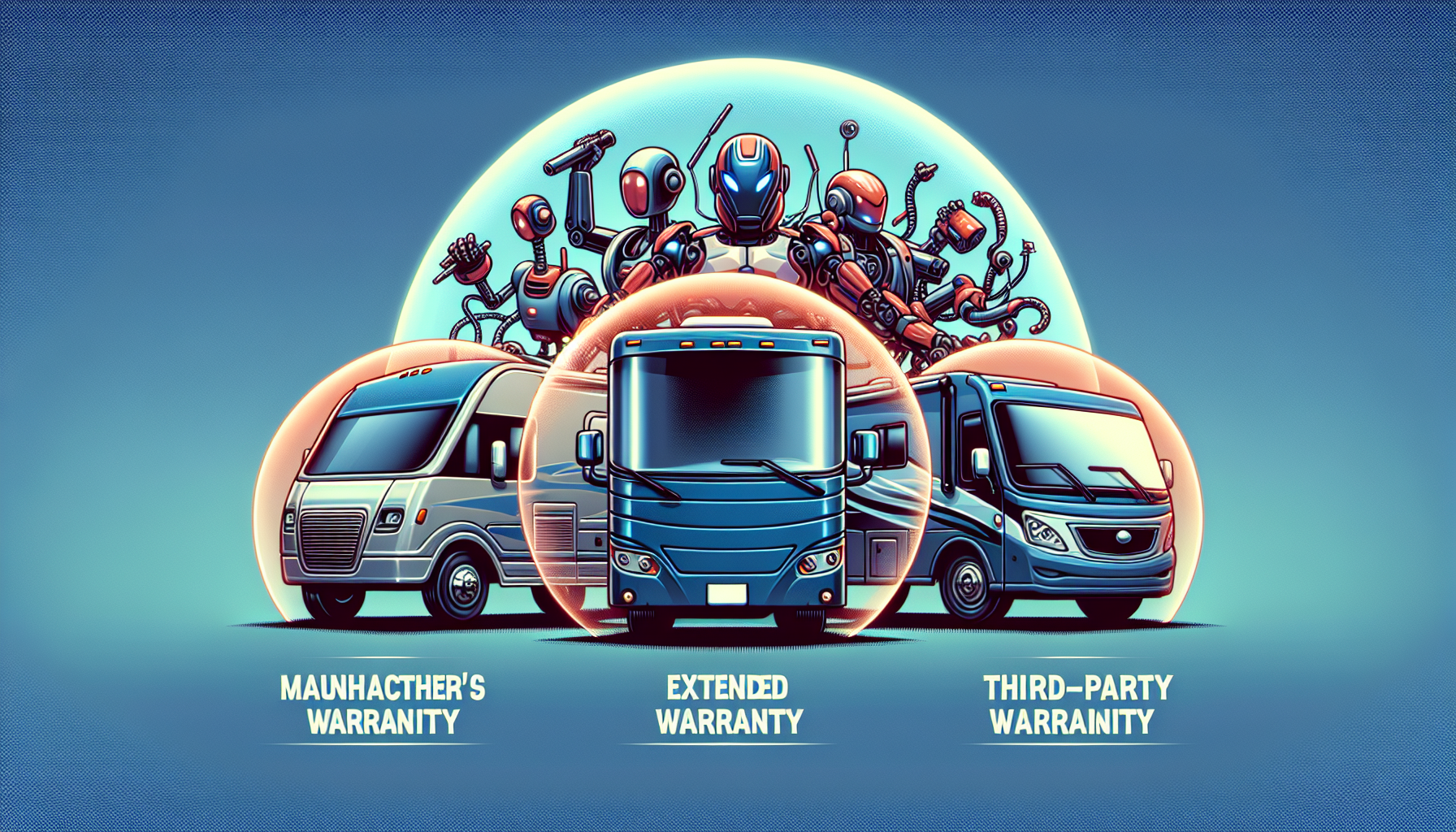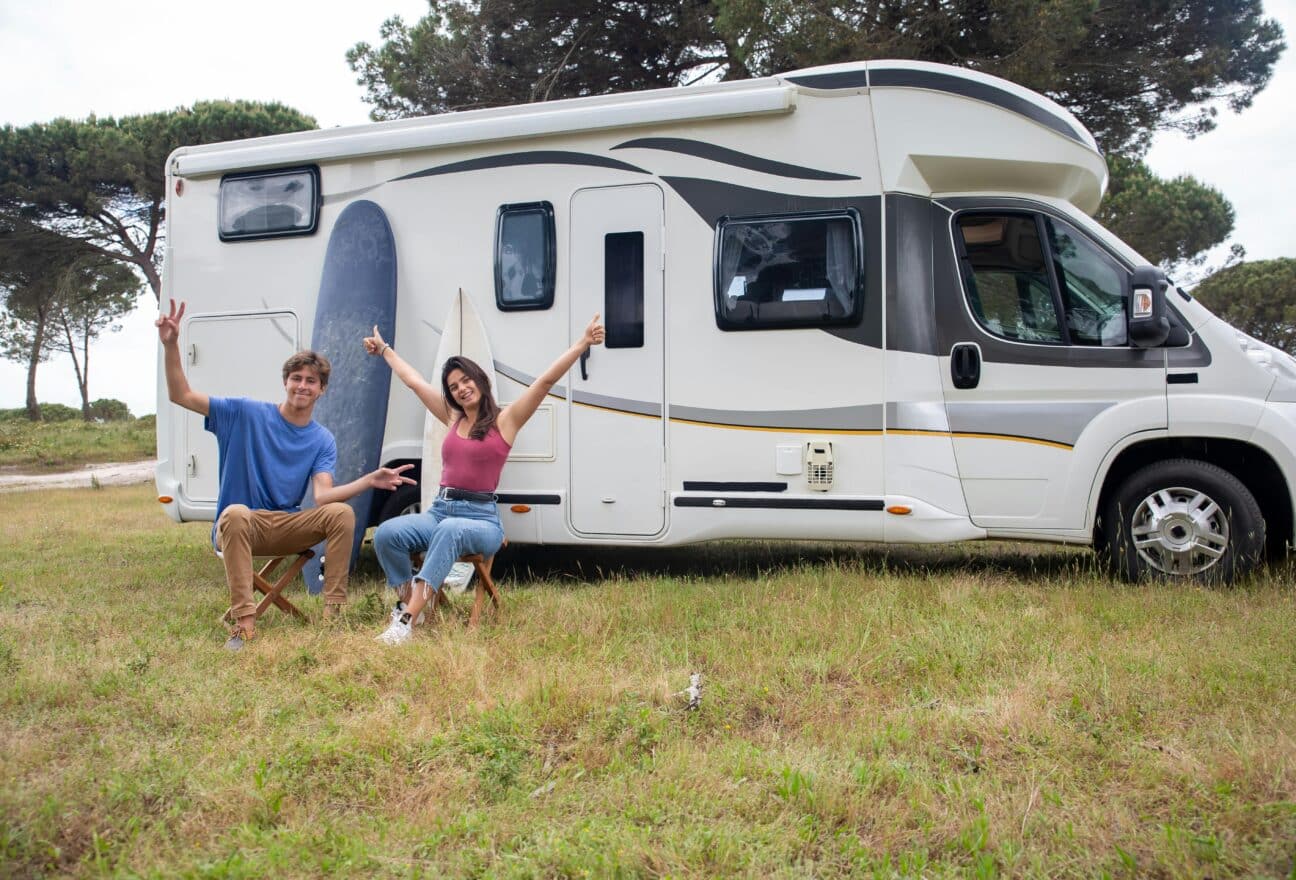When it’s time to choose an RV warranty, the stakes are high, and the options can be dizzying. How to choose the right RV warranty for your needs doesn’t have to be a leap of faith. Our guide is designed to streamline your decision-making process, focusing on what matters most. Dive in as we outline essential considerations for tailoring warranty coverage to your RV lifestyle—without any fluff.
Key Takeaways
- Extended RV warranties come in various forms (manufacturer, extended, third-party) and offer different levels of protection, including coverage for mechanical breakdowns, electrical and plumbing systems, and potentially additional perks like tow services and trip interruption reimbursement.
- Evaluating the appropriate RV warranty requires considering personal usage patterns, vehicle age, and maintenance habits, with options ranging from basic to comprehensive coverage and the potential for enhancing resale value through transferability.
- Choosing the right warranty provider is as crucial as the coverage itself, focusing on provider reputation, customer reviews, BBB accreditation, and the comprehensiveness of their support network and claims process.
Deciphering RV Warranty Types

Imagine you’ve just purchased a new recreational vehicle. The manufacturer’s warranty that comes with it generally covers most components for 1-3 years, addressing issues arising from design flaws. However, what happens after this period? Enter the world of extended RV warranties. These additional coverage options, purchased separately, range from basic to comprehensive, offering protection even after the manufacturer’s warranty expires. Some key features of extended RV warranties include:
- Coverage for mechanical breakdowns
- Protection for electrical and plumbing systems
- Assistance with towing and roadside services
- Reimbursement for lodging and meals in case of breakdowns
- Options for transferability and cancellation
Some extended warranties may require a mechanical inspection if the RV is no longer under the manufacturer’s warranty.
Yet, that’s not all there is to it. There are also third-party warranties that offer protection similar to extended warranties purchased via dealers. These often come at a competitive price, providing RV owners with alternative options for protecting their vehicle. Navigating between manufacturer, extended, and third-party warranties might seem overwhelming. The key lies in understanding these different types to make an informed decision aligning with your travel needs and the specifics of your vehicle.
Personalizing Your RV Warranty

All RVs are not created equal, nor are their usage patterns. How frequently you use your RV, the travel distances you typically cover, and the types of environments your vehicle is exposed to are all factors to consider when tailoring a typical RV warranty. For instance, if your RV is your full-time home or if it’s an older model, you might need additional coverage for specific components like HVAC systems, electrical systems, and plumbing.
Moreover, the age of your RV and how often it’s maintained play a significant role in determining the type of warranty protection necessary. These dictate the reliability and expected deterioration of the vehicle. To choose a plan that aligns with your needs, you should understand the diverse terms and conditions of RV warranties, such as the level of protection offered by exclusionary warranties versus listed component coverage.
Also worth considering is the added value brought by a transferable extended warranty, which can enhance your vehicle’s resale value.
Evaluating Warranty Providers with Precision
Selecting an extended warranty for your RV involves not just considering the coverage it provides, but also who provides it. In the world of RV warranty providers, reputation matters. A good starting point for evaluating a warranty provider’s reliability is checking online reviews and their approval from the Better Business Bureau (BBB). The BBB is an excellent resource for researching business ratings and customer feedback.
Evaluating various RV warranty providers forms an essential part of this process. By investigating their reputation and the services they offer, you can determine if they meet your specific needs. Customer reviews are a valuable resource for gaining insights into a provider’s customer service performance and past consumer experiences.
For those who live in their RVs full-time, choosing warranty plans and providers underwritten by A-rated insurance companies is a prudent step to lessen financial risks.
Transparency in Terms and Conditions
Paying attention to the details is paramount. To avoid unexpected costs and complications, it’s essential to understand which repairs and issues your RV warranty covers and which it doesn’t. Keep in mind that failing to maintain the RV according to the warranty stipulations or modifying the RV without following the manufacturer’s guidelines can result in voiding the warranty.
Feedback from the RV community can be enlightening. Other RV owners often mention issues in getting claims paid and the presence of unexpected coverage limitations when using extended warranties. This underscores the importance of thoroughly understanding your warranty’s terms and conditions.
The Support System
Should your RV break down while on the road, it’s vital to have a warranty provider that offers reliable support. The quality of service and support from an RV extended warranty provider is crucial as they offer access to experienced mechanics and timely assistance when it’s needed.
So, what’s the best way to evaluate a warranty provider’s support system? Prospective buyers often turn to reviews and discussions within RV communities to evaluate the customer service of warranty providers, specifically their responsiveness and support during the claims process.
Cost-Benefit Analysis of RV Warranties

Now, it’s time to delve into the financial aspect. The cost of an RV extended warranty is affected by the following factors:
- The RV’s age and model. For instance, new RVs often incur lower costs due to decreased risk.
- Deductibles. Deductibles for RV extended warranties can vary significantly, affecting the policy’s overall price, with lower deductibles leading to higher costs.
- Manufacturer warranty expiration. The price of extended warranties can rise once an RV’s manufacturer warranty expires, reflecting the heightened risk perceived by warranty providers.
The type of policy you choose also heavily influences the cost of an RV extended warranty. Exclusionary coverage is generally pricier than listed component coverage due to its broader protection. Certain warranty providers pay for RV repairs using a nationally recognized labor-time guide and provide above retail price for parts, ensuring coverage for cost markups at repair facilities.
But does the cost justify the benefits? Many RV owners have found that extended warranties have covered costly repairs, validating the warranties’ financial benefit and the peace of mind they bring. Nonetheless, a discussion exists among RV owners about the worth of extended warranties, weighing the peace of mind they offer against the likelihood of not needing substantial repairs.
The RV owner community can provide valuable insights into negotiating better terms for extended warranties, potentially leading to cost savings or enhanced coverage.
Coverage Insights: Exclusionary vs. Listed Component Warranties

Taking a closer look at extended RV warranties, we can identify two main types: exclusionary and inclusionary, also known as listed component coverage policies. An exclusionary RV warranty offers a more comprehensive plan by covering almost everything except for a specified list of exclusions. On the other hand, listed component coverage details specific items that are covered, and anything not listed is excluded. Options such as Basic, Plus, and Total provide varying extents of protection.
Essentially, exclusionary policies are usually easier to understand and provide broader coverage, whereas inclusionary coverage offers more customization but needs careful analysis to establish what is covered. The choice between the two ultimately boils down to your specific needs and risk tolerance.
Navigating the Claims Process
Once you’ve chosen your warranty provider and have your coverage in place, what happens when you need to make a claim? The process for filing warranty claims for motorhomes, fifth wheels, and travel trailers involves dealing with an extended warranty company and potentially licensed repair facilities.
One of the benefits of an RV warranty lies in the flexibility it provides. Customers needing repairs under an RV warranty can select any licensed repair facility in the US or Canada, granting them greater convenience and flexibility in handling maintenance and repairs.
The Impact of Maintenance on Warranties
The link between consistent maintenance and your RV warranty is unmistakable. Keeping your RV in optimal condition helps avoid breakdowns and ensures the preservation of warranty coverage. Adhering to the manufacturer’s maintenance schedule is imperative to maintain warranty coverage, as neglecting this can lead to voiding of the warranty.
A diligent maintenance plan aids in preventing problems that might result from neglect and could potentially void the RV warranty. Maintenance should follow a schedule, such as monthly, quarterly, bi-annual, and annual check-ups to ensure the RV remains well-maintained. A comprehensive maintenance plan includes routine checks on perishables, awning operations, tire pressure, and the flushing of gray and black tanks.
Utilizing reputable RV specialists for maintenance ensures that the vehicle receives proper care, reinforcing the validity of warranty claims. Lastly, remember to keep detailed service records as they provide proof of maintenance in the event of a warranty claim and help uphold the warranty’s validity.
Community Wisdom: Learning from Other RV Owners
While experience is indeed a great teacher, why not take advantage of others’ experiences to learn? Consulting professionals and fellow RV owners through clubs and forums can greatly enhance one’s understanding of extended warranties and help gather real-life experiences.
RV community members often compile recommendations for warranty providers based on their collective experiences, which can guide new RV owners. Customer reviews and recommendations are integral as they provide real-world insights into a warranty provider’s service quality and customer satisfaction. You can share and discuss your experiences with extended warranties on forums like iRV2, or through clubs like the Escapees RV Club.
Timing Your Warranty Purchase
Another key factor to contemplate is when to purchase your warranty. Purchasing an extended warranty towards the end of the manufacturer’s warranty period can ensure continuous protection coverage as typical manufacturer warranties range from 1-3 years.
But what if your manufacturer’s warranty has already expired? Don’t fret. RV owners have the flexibility to purchase extended warranty coverage at any time, from extended warranty providers, such as wholesale warranties dealerships, or during any stage of ownership, allowing protection to be added as needed.
For those who use their RVs full-time, it’s important to think about extended warranties offering long-term coverage, particularly after the expiration of the standard manufacturer’s warranty. An extended RV warranty can provide additional peace of mind for full-time RV users.
Additional Benefits: Roadside Assistance and More

A worthwhile RV extended warranty resembles a well-packed travel bag – it carries everything you might require on your journey. Many RV extended warranty packages include 24/7 roadside assistance, providing essential services like emergency towing, which is critical for full-time RVers traveling frequently or to remote locations.
Roadside assistance in RV warranties typically encompasses a variety of emergency services such as flat tire repair, jump starts, and fuel delivery, facilitating trouble-free travels. But the benefits don’t stop there.
Some RV extended warranties offer power surge coverage, ensuring protection for appliances and electrical systems against voltage spikes. Providers like America’s RV Warranty also include additional member benefits, ranging from RV insurance to pet benefits and discounts on RV camping facilities.
Summary
As we reach the end of our journey, let’s recap the essential points. RV warranties and extended warranties come in various types, each offering different levels of protection and coverage. Personalizing your RV warranty to your usage patterns, vehicle specifics, and maintenance frequency is key to maximizing its benefits.
Choosing the right warranty provider requires careful evaluation of their reputation, transparency in terms and conditions, and the strength of their support system. Weighing the cost against the benefits of an RV warranty is an important step, considering factors such as the type of policy, deductibles, and the RV’s age and model. Regular maintenance is essential, not just for the RV’s optimal performance, but also for preserving warranty coverage. Learning from fellow RV owners and professionals can provide valuable insights. Finally, timing your warranty purchase and considering additional benefits like roadside assistance can enhance the value of your RV warranty. Remember, the ultimate goal is to enjoy the RV lifestyle with peace of mind, knowing that you’re covered for unexpected repairs and maintenance costs.
Frequently Asked Questions
How much should I pay for an RV warranty?
The cost of an RV extended warranty can vary significantly based on factors such as coverage type, make and model, age, mileage, and the type of RV. Generally, the cost ranges from $1,000 to $10,000.
Is it worth getting a extended warranty on a used RV?
Yes, getting an extended warranty on a used RV is worth it, considering the high costs of RV repairs and the high chance of breakdowns. It’s an important investment to protect your travel budget.
Does living full time in an RV void the warranty?
Yes, living full time in an RV can void the warranty, as manufacturers may consider it outside the intended use of the vehicle. It’s important to consider this before making the decision to live in an RV full time.
What are the different types of RV warranties?
The different types of RV warranties include manufacturer warranties, extended warranties, and third-party warranties, each offering varying coverage options and durations. Consider the specific needs of your RV before selecting a warranty.
How can I personalize my RV warranty?
To personalize your RV warranty, consider factors such as your RV usage, travel distances, environmental exposure, age, model, and maintenance frequency. This will help tailor the warranty to your specific needs.




